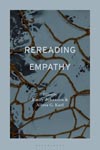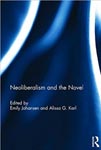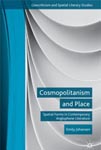
Johansen, Emily and Alissa G. Karl, co-editors. Rereading Empathy. Bloomsbury, 2022.
Over the last few decades and from across a spectrum of centrist political thought, a variety of academic disciplines, and numerous public intellectuals, the claim has been that we need to empathize more with marginalized people as a way to alleviate social inequalities. If we all had more skill with empathy, so the claim goes, we would all be better citizens. But what does it mean to empathize with others? How do we develop this skill? And what does it offer that older models of solidarity don’t? Why empathy-and why now?
Rereading Empathy takes up these questions, examining the uses to which calls for empathy are put in the face of ever expanding economic and social precarity. The contributors draw on a variety of historical and contemporary literary and cultural archives to illustrate the work that empathy is supposed to enable-and to query alternative models of building collective futures.

Johansen, Emily. Beyond Safety: Risk, Cosmopolitanism, and Contemporary Neoliberal Life. Bloomsbury, 2021.
Beyond Safety argues that concerns about the ethical impossibility of individual safety in the face of risks with increasingly obvious global consequences alters representations of neoliberal contemporary life. As the climate crises in the Caribbean and Australia, ongoing European refugee and American border crises, and, most recently, anxieties about Coronavirus illustrate, contemporary life is characterized by global connections that produce and reflect precarious outcomes and dangers. The ability to ignore risk or shift it to others underscores the fact that it is mitigable for particular segments of society while inescapable for others.
Emily Johansen investigates depictions of global danger and safety in contemporary transnational fictional and popular texts-those characterized by a narrative or representational emphasis on border crossing and global interdependences. She demonstrates how these texts use risk to question and re-imagine the norms and practices of contemporary global citizenship.
Beyond Safety thus brings together three of the central keywords of contemporary literary criticism of the last ten years (cosmopolitanism, precarity, neoliberalism) and shows how their intersection allows for a fuller conception of contemporary life and imagines a new global future.

Johansen, Emily and Alissa G. Karl. Neoliberalism and the Novel. Routledge, 2015
The novel form has long been connected to modern capitalism and is, arguably, the literary genre most prominently enmeshed in contemporary global markets. Yet, as many critics have suggested about capital, something has changed in the last forty years. With the rise of neoliberalism as the dominant global economic rationality and mode of governance, the experience of capital has produced new ways of seeing and relating to the world, leading, as David Harvey observes, to “the financialization of everything”. The novel, indexed to capital in myriad ways, then, must similarly have been transformed.

Johansen, Emily. Cosmopolitanism and Place: Spatial Forms in Contemporary Anglophone Literature. Palgrave, 2014.
Cosmopolitanism and Place considers the way contemporary Anglophone fiction connects global identities with the experience in local places. Looking at fiction set in metropolises, regional cities, and rural communities, this book argues that the everyday experience of these places produces forms of wide connections that emphasize social justice.
Other Publications
- “Putting Empathy to Work: Narrative and the Entrepreneurial Use of Trauma.” Rereading Empathy, eds. Emily Johansen and Alissa G. Karl, Bloomsbury, 2022, pp. 41-60.
- “Introduction: Why Empathy? Why Now?” (Co-written with Alissa G. Karl). Rereading Empathy, eds. Emily Johansen and Alissa G. Karl, Bloomsbury, 2022, pp. 1-19.
- “Cosmopolitan Risk, Neoliberal Unfreedom: Transparency and Responsibility in John Le Carré’s The Constant Gardener.” Open Library of Humanities. 4.2 (2018).
- “History in Place: Territorialized Cosmopolitanism in Teju Cole’s Open City.” Diaspora. 20.1 (2018): 20-39.
- “The Neoliberal Gothic: Gone Girl, Broken Harbor, and the Terror of Everyday Life.” Contemporary Literature. 57.1 (2016): 30-55.
- “Bureaucracy and Narrative Possibilities in Kazuo Ishiguro’s Never Let Me Go.” Journal of Commonwealth Literature. 51.3 (2016): 416-31.
- “Muscular Multiculturalism: Bodies, Space, and Living Together in Andrea Levy’s Small Island.” Critique: Studies in Contemporary Fiction. 56.4 (2015): 383-98.
- “The Banal Conviviality of Neoliberal Cosmopolitanism.” Textual Practice. 29.2 (2015): 295-314.
- “Becoming the Virus: Re-Thinking and Re-Placing Cosmopolitanism in Hari Kunzru’s Transmission.” Journal of Postcolonial Writing. 49.4 (2013): 419-31.
- “Risky Cosmopolitanism: Risk and Responsibility in Catherine Bush’s The Rules of Engagement.” ARIEL. 42.1 (2011): 129-47.
- “The Political Allure of the Local: Food and Cosmopolitanism in Timothy Taylor’s Stanley Park and Ruth L. Ozeki’s My Year of Meats.” Politics and Culture. 2 (2009).
- “Imagining the Global and the Rural: Rural Cosmopolitanism in Sharon Butala’s The Garden of Eden and Amitav Ghosh’s The Hungry Tide.” Postcolonial Text. 4.3 (2008): 1-18.
- “‘The streets are the dwelling place of the collective’: Public Space and Cosmopolitan Citizenship in What We All Long For.” Canadian Literature. 196 (2008): 48-62.





